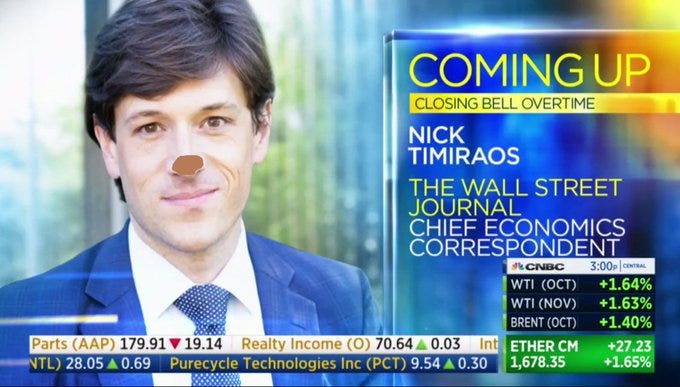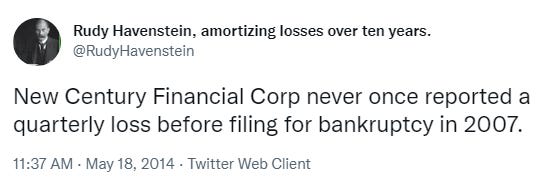"As usual in human affairs, what determines the behavior are incentives for the decision maker." - Charlie Munger
After lunch, at Michelle’s request, I took calls from reporters. If we were going to hold our own in the court of public opinion, we needed to get our side of the story out. Generally, I spent the most time with the beat reporters who wrote regularly about the Fed, including Jon Hilsenrath of the Wall Street Journal, Greg Ip of the Economist, Krishna Guha of the Financial Times, Neil Irwin of the Washington Post, John Berry of Bloomberg, Steve Liesman of CNBC, and Ed Andrews of the New York Times. I knew that these more specialized reporters were best equipped to understand and then explain what we were doing and why. Other media would pick up on their reporting.
- Ben Bernanke, The Courage To Act In My Own Best Interest

Unelected. Unaccountable. Constantly wrong. Dangerous.
Podcasts
Leigh Goehring: The Global Food & Fertilizer Crisis Is Much Bigger Than Russia/Ukraine
Financial Historian (and again for 2024 my Presidential pick), Jim Grant
Hidden Forces Podcast: ALEX JONES & THE WAR ON INFORMATION with ALEX LEE MOYER (I admire Demetri for doing this podcast. Unlike him, I never watched Alex Jones. I was aware of him of course, but he wasn't in my queue. I'm sure Demetri will get shit for being nuanced. That just means he's doing a good job.)
Red Scare Podcast: Alex's War w/ Alex Jones and Alex Lee Moyer
"It all comes down to 1971 and Richard Nixon, so that's when the wheels started to come off, because we went from a currency that had backing to a currency that could be created by fiat, out of thin air." - Mark Yusko
...the banks collectively are doing what Havenstein was doing in the 1910s to ‘18, which was monetizing governmental debts. That’s what he was doing, that’s what got Germany into trouble, and we’re doing it now. It’s just a much larger scale...throughout all economies…
Merkel's "decision to shutter the nuclear industry in Germany was purely opportunistic. She saw an opportunity to overtake the Greens on the left...It didn’t matter to her in the least what the consequences were, didn’t think it through."
…A pitchfork "was the only weapon that the working classes, the peasants, could have access to that gave them the ability to keep a better armed foot soldier at distance." - Sir Steven Wilkinson

"In ‘Truly Alarming’ Sign, Surging UK Yields Fail to Rescue Pound"
UK inflation will hit 18% in early 2023, says leading bank Citi


“It’s absolutely bonkers how much demand was driven by the central bank.” Oh Canada!
Existing homes are apparently at 3.3 months of inventory, but I don’t have a long term chart of that.
US Mortgage Lenders Are Starting to Go Broke
There’s no systemic meltdown coming this time around, because there hasn’t been the same level of lending excesses
I hear this all the time. Are we so sure about this?
First Guaranty employed 600 people before it filed bankruptcy in June and made $10.6 billion in loans last year, according to court records. Days before seeking court protection, the company fired 471 workers because it couldn’t get enough financing to overcome a cash crunch.
March 2007: Mortgage Crisis Spirals, and Casualties Mount “We made so much money you couldn’t believe it. And you didn’t have to do anything. You just had to show up.”
After 2,240% Run, Tesla Visionary Leaves UK Fund Bleeding Money
For years, he rode the likes of Amazon.com Inc. and Tesla Inc. to the moon, earning a reputation as the techno-visionary oracle of Edinburgh. Now, James Anderson, bull-market hero, has left behind a precarious legacy.
It’s been three months since Anderson, 63, retired from Baillie Gifford, the century-old Scottish money manager he transformed into an unlikely power-investor in global technology. Awkward timing, to say the least.
Before Cathie Wood and Ark Invest, before crypto and “stonks,” Anderson began transforming Baillie Gifford’s prosaically named Scottish Mortgage Investment Trust — founded in 1909 to finance rubber plantations and later Baillie Gifford’s flagship product — into one of the world’s top performing funds of its kind for a decade.
But the tech stock meltdown has left the firm bleeding assets this year, losing a staggering 100 billion pounds ($122 billion) by the end of June.
Reminded me of this:
Meet the decade's best-performing U.S. diversified stock mutual fund: Ken Heebner's $3.7 billion CGM Focus Fund, which rose more than 18% annually and outpaced its closest rival by more than three percentage points.
Too bad investors weren't around to enjoy much of those gains. The typical CGM Focus shareholder lost 11% annually in the 10 years ending Nov. 30, according to investment research firm Morningstar Inc.
And this:
Peter Lynch, author of “One Up on Wall Street” ran the Fidelity Magellan fund from 1977-1990. He delivered an outstanding 29% average annual return during that period.
Afterwards, Fidelity conducted a study of the fund. They found that the average investor in the Magellan Fund lost money during Peter Lynch’s tenure!
Private Equity Wants to Wash Your Car
Buyout firms are buying and bundling small businesses, from car washes and dentist offices to auto-repair shops and dry cleaners
I think this is a very bad trend.
Sure, why not.

You keep losing every vote 8-1, but there aren't nine opinions, there's only two...yours, and the other eight, and they're all wrong. - supposedly Gordon Brown
He is not in it for money or community per se but more art, freedom of expression, accountability of power and general naughtiness - Raoul Pal
I would submit that if you can just reach a few people, you've really done what you set out to do. Hopefully those people talk to other people, and it becomes a viral thing. - Guy Adami

















Dear Mr Havenstein. I've been following you for 100 years now and I am happy to inform you that, as in the 1920s, I have once again gone out to buy myself a wheelbarrow. For the fiat notes I shall soon be carting around in it.
If only literally everyone could read this, and engage their brains beyond first gear.